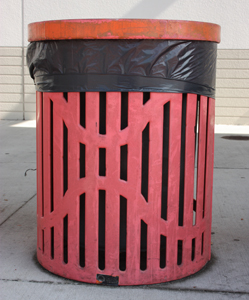 Their bodies lay slumped over the tables, rising and falling with the rhythm of their breathing. The tick of the clock slows, bringing with it an increasingly tangible sense of boredom; both the students and administrator in attendance are forced to endure 30 minutes of pseudo-punishment, the only requirement being silence throughout the duration of the detention.
Their bodies lay slumped over the tables, rising and falling with the rhythm of their breathing. The tick of the clock slows, bringing with it an increasingly tangible sense of boredom; both the students and administrator in attendance are forced to endure 30 minutes of pseudo-punishment, the only requirement being silence throughout the duration of the detention.
The most common punishment on campus is the 30-minute detention, given for minor infractions such as dress code violations, tardies and using an electronic device during class time. These detentions, however, are merely glorified study halls. Parallel to the time outs of one’s kindergarten years, these detentions are a mockery of a punishment and do not adequately fulfill their purpose of discouraging bad behavior. They must become more productive.
Detentions are overdue for an overhaul; like the student who acts out as a desperate call for attention, these detentions are begging for a revision that will transform them into effective, purposeful and productive punishments.
The fundamental idea behind having punishments is, that by serving time, the offender will be discouraged from committing the act again. Modeled after humankind’s instinctual avoidance of pain, punishments are effective given the penalty causes enough discomfort that the offender will be dissuaded from misbehaving again.
Our detentions, however, do not follow this logic. Apart from the anguish caused by time creeping by, students face little discipline for their actions. These detentions serve no purpose and fail to meet their original goal. Lack of effective punishments will do little to prevent poor behavior, and true punishment is not doled out until after a sixth infraction. Not only is this excessive, but it only further encourages poor behavior. Allowing students to commit six infractions is evidence of a broken system.
Instead, detentions should resemble Saturday school, the result of six repeat infractions. In Saturday school, students are responsible for completing tasks such as picking up trash and assisting the janitorial staff for three hours.
This manual labor is a much more effective punishment than a normal detention. Not only are students more likely to respect school property after cleaning it extensively, but they are also more likely not to commit additional infractions.
For these reasons, detentions should be adjusted to resemble Saturday school. Doing so would bring purpose to campus punishments and achieve administrators’ original intent for the 30-minute detention.
The largest problem with changing current detentions is the time limitation. Offenders are only required to serve 30 minutes, thus the time constraint limits what tasks students can complete. However, one duty students could be responsible for is cleaning the cafeteria. Simply by adjusting the custodial staff’s cleaning schedule, the cafeteria could be left as a task to be completed during detentions.
The benefits of altering the detentions far outweigh the logistics behind changing them. Current detentions are merely a forced study hall; they serve no purpose, nor do they adequately discourage bad behavior. However, if students were required to clean or complete other manual labor during detentions, the campus would be left in better condition and with more well-behaved students.